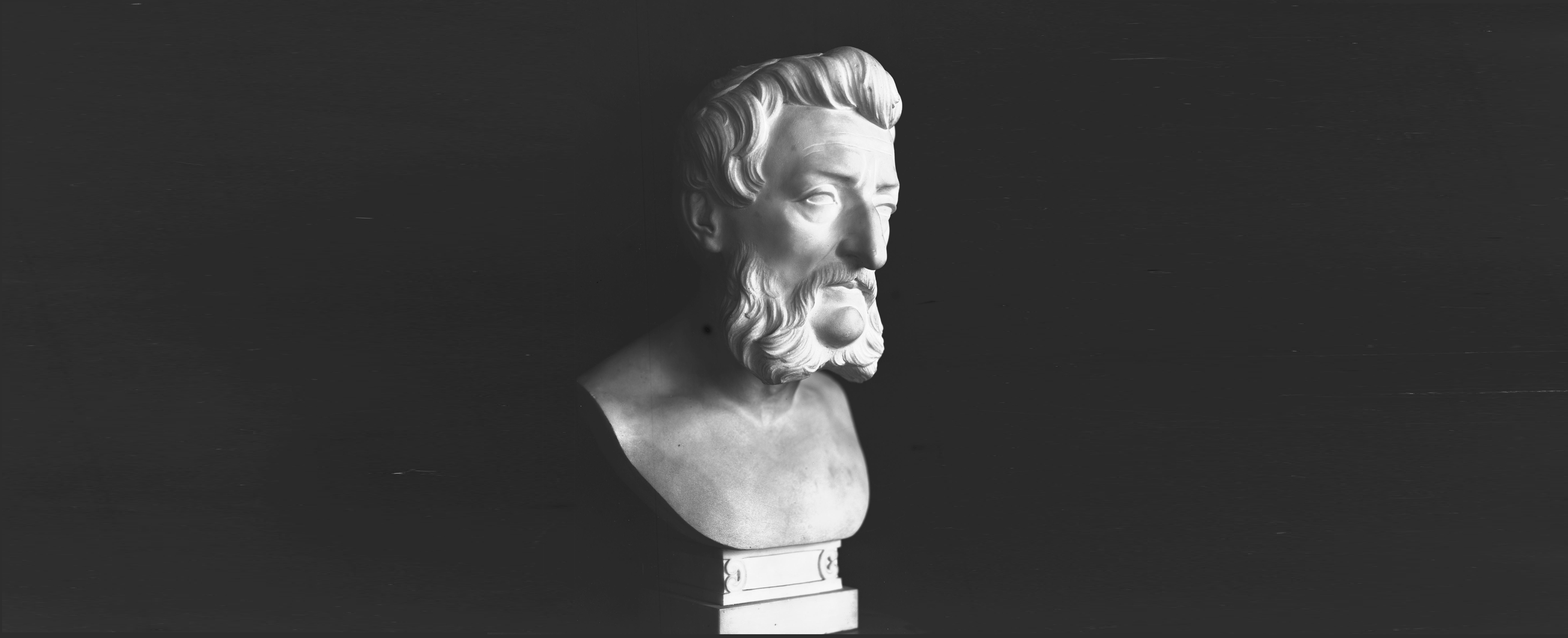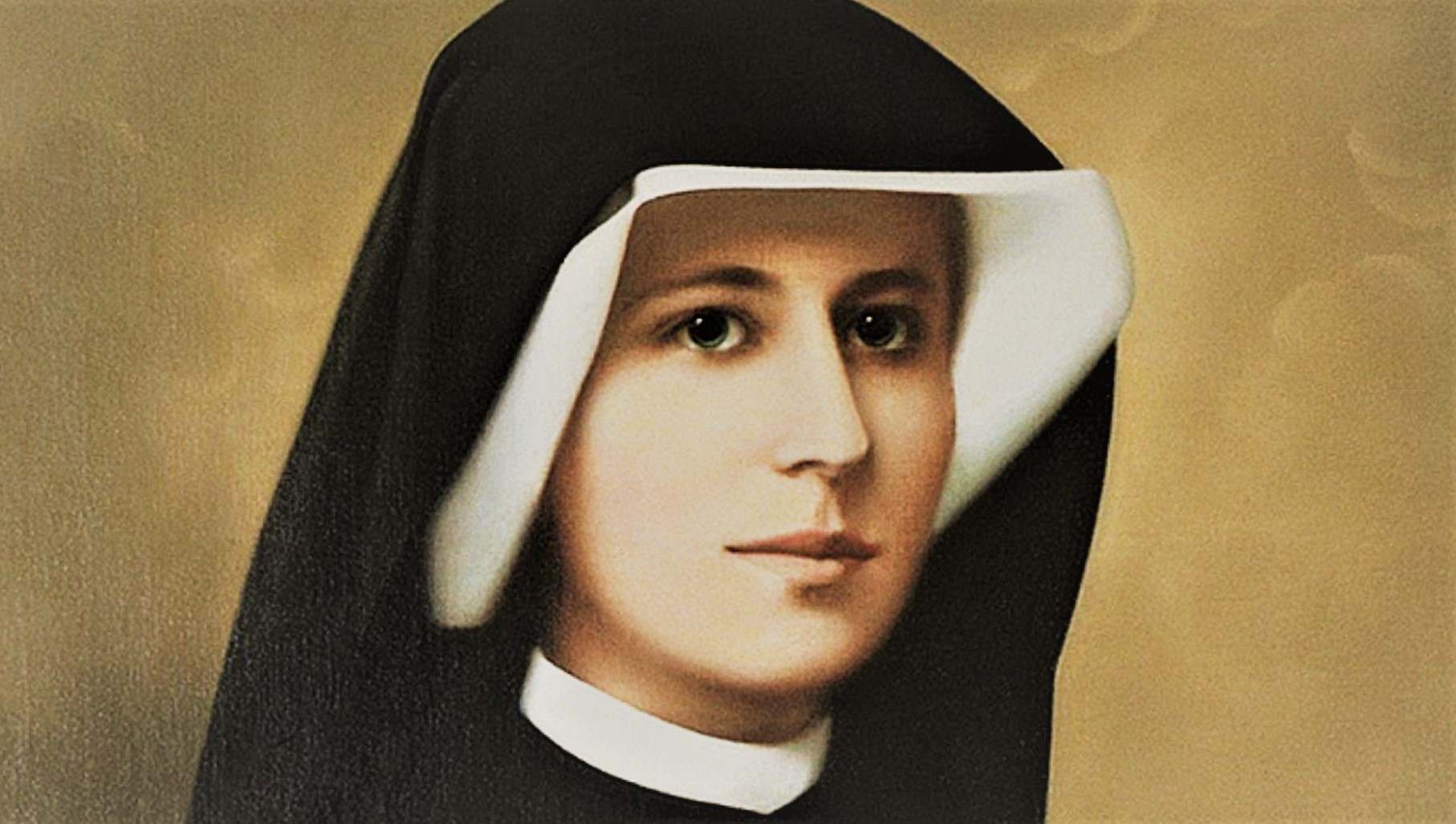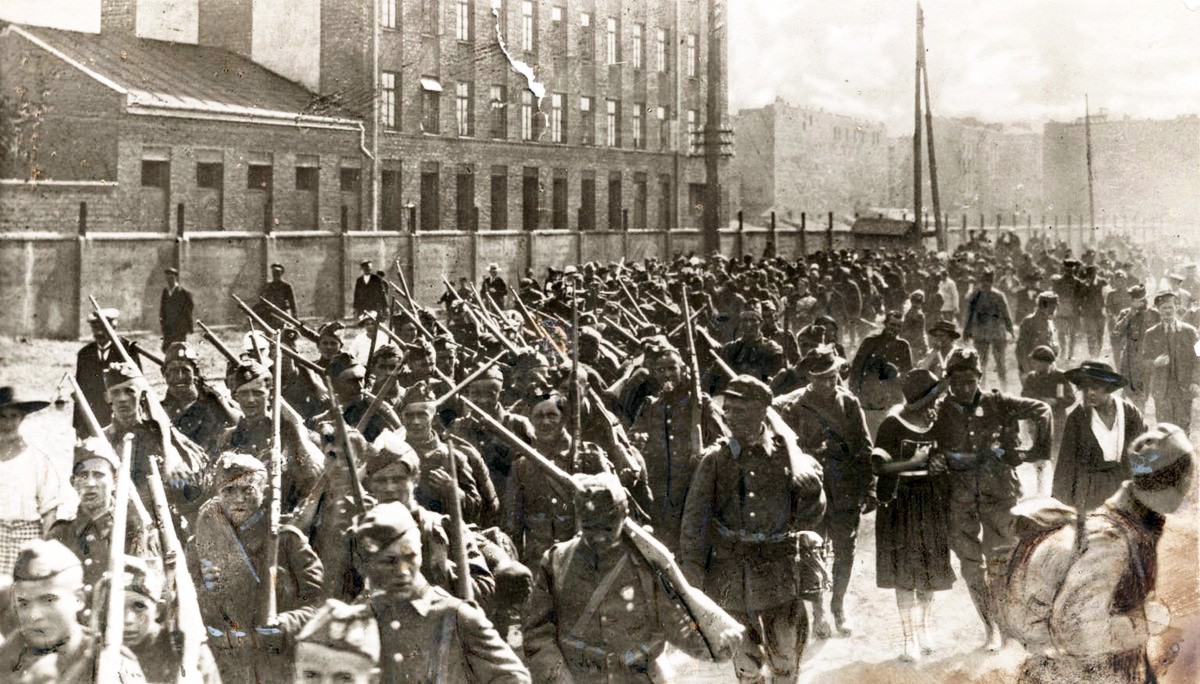Incredibly insightful as a historian, he wrote in a heavy-handed style. But for one sentence: ‘For our freedom and yours!’, he should have been named the first copyrighter among the revolutionaries.
by Wojciech Stanisławski
Above-average ten-year-olds, collectors of maps and insects, incidentally mastering numerous languages, often become serious scientists. Their parents, and especially their aunts, are delighted to have a child prodigy, although there are some who apply the word ‘nerd’ through clenched teeth.
To Lelewel, both terms would fit. Fragile as a child (he supposedly mastered the art of walking only after turning three), as a teenager he absorbed all knowledge and wrote his own encyclopaedia. Most of the time he was educated as an extern. This solution was much more popular in education 200 years ago than today, but Lelewel was a special case here too. He even received his doctorate extramurally, from Jagiellonian University in Krakow, in 1820.
By that time, he had already had his first series of lectures in general history, delivered in 1815 in Vilnius, attempts at working in the administrative structures of the Duchy of Warsaw, and a post as librarian at the restored University of Warsaw. The last-mentioned he used to lay the foundations of Polish bibliography. It was not until 1821 that he was appointed to the Chair of History at the University of Vilnius. His inaugural lecture attracted an unprecedented 1,500 people!
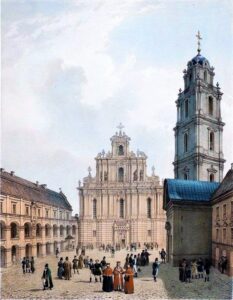
These few sentences above have been written as if we were dealing with the career rise of a promising humanist at the beginning of the 19th century. Lots of talent, seeking a foothold in three academic cities – what is strange about that? Only that these three cities lay in three, or rather four different countries: Lelewel’s youth takes place in the first quarter of a century after the territories of the Polish-Lithuanian Commonwealth were ultimately divided in 1795 between the three neighbouring powers: Prussia, Austria and Russia. This means that the Warsaw, in which Lelewel tried his hand as Secretary at the Ministry of the Interior in 1811, was the capital of the Duchy of Warsaw, established by Napoleon as a satellite of France. This Warsaw, where seven years later he was putting in order the collection of the University Library, was already the capital of the Kingdom of Poland – a state created under the provisions of the Congress of Vienna, autonomous, but united by its ruler with Russia. Krakow, from where Lelewel received his doctorate, was the capital of the Republic of Krakow – a miniature city-state, stuck in the gap between Austria and Russia, and granted a fragile and dubious independence at the Congress of Vienna.
Finally, Vilnius, where Lelewel is ecstatically received in 1821, was the former capital of the Grand Duchy of Lithuania. It was one of the most important cities of the former Polish-Lithuanian Commonwealth, since 1795 – with a ‘Napoleonic’ break of a few months – to remain under Russian rule, and was ironically given the honour of being the capital of a governorate.
Initiation? Into palaeography, not Freemasonry
Even this simple calculation, which does not take into account all the nuances of international politics of the time, shows the pressures under which Lelewel had to operate. He was not the politician type: he shunned backstage negotiations, and was not good at intrigue. What is more, he seems to have kept a distance, bordering on indifference, towards many public emotions. ‘He did not get emotionally involved on Napoleon’s side,’ one can read in his academic biography, although this sentence does not reflect fully how unusual this was among politically engaged Poles at the beginning of the second decade of the 19th century.
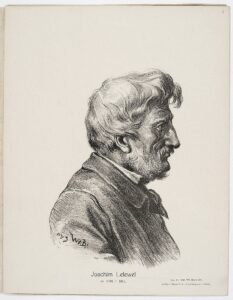
He was really fascinated by sigillography, early medieval numismatics and palaeography. His first publication (1807) was on Scandinavian epos, “The Poetic Edda”, and he lectured on the methodology of historical research. He was fascinated by auxiliary sciences of history. He was an innovator on a European scale when it came to the history of historiography, the use and interpretation of cartographic and geographical data, he studied the typeface of old prints and motifs on coins. At the same time, he was characterised by independence of thought, courage and a tendency to broader reflection. Wondering about the direction of the development of Polish history, he paid attention to the increasing freedom of subsequent layers and social classes, which he referred to as ‘communal governance’. Moreover, he cherished romantic admiration for ‘freedom’ as a social value and for those who were its heralds, probably even in ancient times. All this was enough for politicians appointed by Saint Petersburg to control Polish social and scientific life to regard him with suspicion.
Lelewel was released from his lecturing duties in Vilnius in 1824. He owed this to Nikolay Novosiltsev, who was investigating student conspiracies in that city, a trusted collaborator of Tsar Alexander I and the creator of police networks supervising Poles in the Kingdom of Poland and the Russian Empire. Having settled in Warsaw, he supported himself for a few years only by occasional stipends and honoraria, working incessantly. He bore no grudge against the Russians. The Russian Liberals (insofar as such a formation could have emerged in the first years of Nicholas I’s reign) read him, quoted him and invited him to become a member of successive scientific societies.
Politics knocked on the door
In the Kingdom of Poland, however, it was much easier to demonstrate liberal tendencies. In 1828, Joachim Lelewel became a deputy to the Sejm of the Kingdom of Poland, where – affiliated with the ‘Kalisz party’ – he advocated freedom of the press, openness of Sejm sessions and liberalisation of family law. To this day, there are disputes as to how deeply he was involved in various kinds of plots and conspiracies, from Freemasonry (which soon assumed a subversive character in the Kingdom of Poland) to conspiracies of the Carbonari. However, research on sources indicates that he tended to lean towards these structures rather than become deeply involved in them. Young people brought up on Schiller, however, were less interested in his Historical Parallels between Poland and Spain (the first sensu stricto example of comparative studies in Polish historiography), and more so his vision of Greek and Roman tyrannicides. It was politics that knocked on his door, not the other way round.
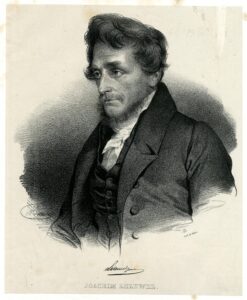
It knocked decisively on 21 November 1830, eight days before the outbreak of the uprising against the Russian governor in Warsaw. The young officers had had enough of arrests, censorship and dozens of unconstitutional moves by the brother of Nicholas I, i.e. Grand Duke Konstantin, who ruled the Kingdom of Poland with a strong hand. In the evening, the historian is visited by Piotr Wysocki, at the head of a conspiracy of officers, with two companions. Overtaken by his father’s serious illness and distracted from writing, Lelewel gives a general answer: yes, he himself will certainly support the uprising, and will also guarantee his seat in the Sejm. By a ‘revolt’ he means the overthrowing of Konstantin’s rule rather than a full-scale war with Russia.
When, in mourning over his father’s death, he appears in the backstage of the Sejm nine days later, he will see how much has been done, how many chances have been wasted. On 29 November, officers seized power in the city, and handed it over to the Polish political elite of the Kingdom. This elite, aware of the power of Saint Petersburg and reluctant to ‘inflame the heads of young men’, hesitated about whether to launch an armed struggle and what goals to set for itself.
Lelewel finds himself both emotionally and generationally between these two circles. He sees the need for a ‘social revolution’, by which he means ‘the improvement of the condition of all classes in the nation’. First, however, he wants to guarantee its independence. In the eyes of the old men in the government he is a demagogue, in the eyes of the officers he is an authority. It was to the latter fact that he was appointed to a subordinate post in the conditions of the insurrection, that of ‘acting Minister of Religion and Enlightenment’. He did not have enough influence to decide on the course of action or strategic decisions when the Polish-Russian war began on a large scale. As one who grew up in the Romantic era, and at the same time as an educator of poets who would write in that spirit, he proved himself in words. He was the author of the slogan ‘For our freedom and yours’ addressed to Russian soldiers marching on Warsaw.
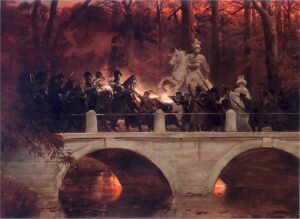
Best Polish expression
‘For our freedom and yours we fight’ was the meaning of the slogan, embroidered in two languages on the banners. It is doubtful whether it convinced the Russian soldiers, who were mobilised for battle by semi-slave discipline and were usually illiterate. Nevertheless, it remained in Polish tradition. For the following half-century, it was raised time and again in successive uprisings across Europe, wherever Poles engaged in a struggle against local tyrants, convinced that the growth of freedom in Europe must lead to freedom on Polish soil as well. Even later, this phrase, one of the finest among Polish ‘winged words’, accompanied various bloody events.
For the time being, however, the November Rising was collapsing: under the pressure of successive Russian offensives and in the face of Prussian and Austrian blockade of borders and arms shipments. Lelewel left Warsaw on 8 September 1831, escaping the Russian siege together with the entire government. On the way, in the small town of Zakroczym, he received – empty gestures – a ‘full’ ministerial nomination. At the last session of the Sejm, he himself made a gesture of unequal significance: he called for the establishment of a new distinction named the ‘Star of Perseverance’, for Poles who, remaining in the territory of the Kingdom, would continue their resistance against the partitioners. The decoration was never established, although over the following years there would be no shortage of dames and cavaliers worthy of the nomination.
The successive thirty years of his life saw a return to the two circles outlined above, the parallel political life and the (unevenly more intense) academic one. In the former, like every politician in exile, he had varying and diminishing successes. These failures were probably caused by his personality, a lack of talent for large-scale public activity, and the situation in Europe: given the solidarity of the three partitioning states, the Polish situation seemed hopeless. Lelewel set up one of several competing ‘political committees’ among the émigrés, advocating a social revolution on Polish soil and in the whole of Central Europe. This activity soon alarmed the French authorities, who deported him to a safe, bourgeois Belgium, located somewhat on the sidelines of events (though in the heart of Europe). From there, Lelewel would carry on an abundant correspondence, inspire further emissaries to the country, support revolutionary committees and radicals across the continent – never, however, achieving immediate success.
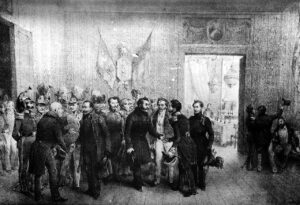
He only saw gold coins in other people’s collections
In two rooms, living alone, refusing not only scholarships but also paid academic positions, he wrote tirelessly on everything historical, from medieval descriptions in Arabic of other countries to Merovingian coins. A characteristic feature of child prodigies: from a young man with a fancifully tied scarf around his neck and bushy sideburns (as depicted in his drawings from the 1820s), he quickly transformed into an old man: neglected, covered in strange capes, constantly smoking a pipe.
Only that this old man will be visited by envoys from all three sections of partitioned Poland, bumping into British and French medievists at the door. Numismatique du Moyen-Âge published in 1835 was a greater success than the expedition launched in the same year, with Lelewel’s support, of ‘emissaries’ sneaking into Polish territories with the intention of agitation. Published a dozen years later, Geographie du Moyen-Âge was more eagerly read at European universities than the manifestos of the Spring of Nations.
He held in his hand the threads of correspondence and conspiracies, but failed to weave from them anything as thrilling as those banners, in Polish and Russian, proclaiming ‘our freedom and yours’. He talked about them as late as in 1855 with Alexander Herzen, the leader of the liberal Russian émigré milieu. In the meantime, however, he was sorting out the notes that were straggling all over the place and passing them on to libraries. He was waiting for the Summer of Nations.
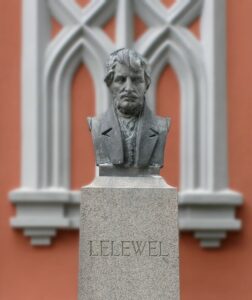
He died before it came, on 29 May 1861, in the Paris clinic of Dr Dubois. Numerous lay and religious memorial services were organised in partitioned Polish, especially under Russian rule, where, just after the death of Tsar Nicholas, hopes and emotions were rising for another uprising. In Paris, his was just another Polish grave in the Montmartre cemetery. Ludwik Wołowski, a Polish émigré who had already made a career in French banking, spoke at the grave. For democratic purposes, the funeral organisers invited a Parisian worker and a rabbi to speak there too, even though Lelewel had little in common with either sphere.
One hundred and several dozen volumes of works and a collection of medieval maps were left behind, transferred to Vilnius in a strange twist of fate and still catalogued by stock takers even in Soviet times. In addition to this – an honour that smacks somewhat of a contradiction in terms: the most classicising poem written by the most romantic Polish poet. This is how one should describe the longer poem titled ‘To Joachim Lelewel’, written in 1822 by Adam Mickiewicz upon learning that the adored history professor had resumed his lectures. The lengthy text written in Polish alexandrine depicts ‘the march of freedom through countries’. And then there are those five words: ‘For our freedom and yours’, in case that march is delayed.
Author: Wojciech Stanisławski
Translation: Alicja Rose & Jessica Sirotin

